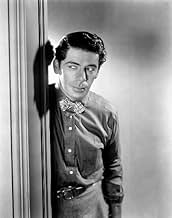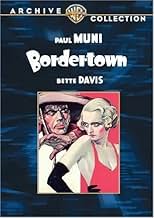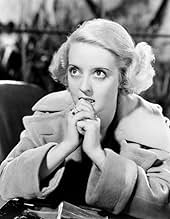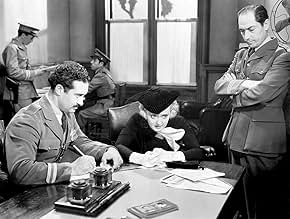AVALIAÇÃO DA IMDb
6,6/10
2,1 mil
SUA AVALIAÇÃO
Adicionar um enredo no seu idiomaIn Mexico, a former lawyer becomes the invaluable second-in-command to a casino owner, whose wife begins to fall for him.In Mexico, a former lawyer becomes the invaluable second-in-command to a casino owner, whose wife begins to fall for him.In Mexico, a former lawyer becomes the invaluable second-in-command to a casino owner, whose wife begins to fall for him.
- Direção
- Roteiristas
- Artistas
Soledad Jiménez
- Mrs. Ramirez
- (as Soledad Jimenez)
William B. Davidson
- Dr. Carter
- (as William Davidson)
Oscar Apfel
- Judge Rufus Barnswell
- (não creditado)
Wade Boteler
- Man Wanting to Buy Roark's Casino
- (não creditado)
Glen Cavender
- Man Restraining Johnny in Courtroom Fight
- (não creditado)
Jack Chefe
- Waiter
- (não creditado)
Wallis Clark
- Friend of Dean on Podium
- (não creditado)
Carlos De Valdez
- Magistrado
- (não creditado)
Avaliações em destaque
A film where everyone gets whats coming to them, and true to the 1930's formula, in melodramatic fashion. Featuring the now forgotten Paul Muni (was he really a superstar back then?) as a Hispanic lawyer who learns a hard lesson about the facts of life. Muni, as usual plays it weird; before and after Bordertown, he is a pretty normal guy but while he is in Bordertown he becomes a Hispanic parody. But nevermind that, this film has Bette Davis playing yet another scheming psychopath as only she can. Like the several other Davis movies that she had a minor role in ("Fog over Frisco" and "In This Our Life", to name two), her twisted character stays with you long after she is gone. Plus, she's a blonde! Yowza!
Archie Mayo's "Bordertown" is a film that by today's standards would be deemed politically incorrect. The idea of the poor Mexican immigrant that wants to better himself, only to see people step all over him, is at the center of this tale.
Juan Ramirez, the young lawyer, trying to defend the victim of an accident caused by the young and reckless Dale Elwell, is defeated by a much more experienced Anglo lawyer, who happened to know the system and the judge, obviously. As a result, Juan, decides to leave L.A. to go to a border town, probably Tijuana, where he becomes a partner of Charlie Roark, a decent man who sees the potential in Johnny, as he calls himself now.
What Charlie doesn't know is that he is married to a scheming woman that couldn't care less for him. She has to get rid of her husband in order to get her hands on his money and looks to Johnny to help her, but of course, he wants nothing to do with her.
Paul Muni was a great star at Warner Bros. at the time of this film. We were never fans of Mr. Muni, who in this film gives a clichéd account of the Hispanic Juan in a performance that goes over the top and doesn't convince anyone. On the other hand, Bette Davis, as Marie Roark, is her usual excellent self in a more nuanced performance. We see why later on, Ms. Davis will use all what she shows in this film and more to be the great star that she was. In minor roles, the formidable Eugene Palette plays Charlie Roark and Margaret Lindsay is seen as Dale Elwell, the rich girl that provoked the accident.
This film is a rarity seldom seen these days.
Juan Ramirez, the young lawyer, trying to defend the victim of an accident caused by the young and reckless Dale Elwell, is defeated by a much more experienced Anglo lawyer, who happened to know the system and the judge, obviously. As a result, Juan, decides to leave L.A. to go to a border town, probably Tijuana, where he becomes a partner of Charlie Roark, a decent man who sees the potential in Johnny, as he calls himself now.
What Charlie doesn't know is that he is married to a scheming woman that couldn't care less for him. She has to get rid of her husband in order to get her hands on his money and looks to Johnny to help her, but of course, he wants nothing to do with her.
Paul Muni was a great star at Warner Bros. at the time of this film. We were never fans of Mr. Muni, who in this film gives a clichéd account of the Hispanic Juan in a performance that goes over the top and doesn't convince anyone. On the other hand, Bette Davis, as Marie Roark, is her usual excellent self in a more nuanced performance. We see why later on, Ms. Davis will use all what she shows in this film and more to be the great star that she was. In minor roles, the formidable Eugene Palette plays Charlie Roark and Margaret Lindsay is seen as Dale Elwell, the rich girl that provoked the accident.
This film is a rarity seldom seen these days.
Although Paul Muni does go over the top a bit in Bordertown, the film remains a savage indictment of racism, concentrating as it does on the struggles of one man in a racial/ethnic minority to find a place in this society.
In a biography of Paul Muni I read that he deliberately hired a Mexican driver who stayed with him for several weeks so he could copy his mannerisms and get down the proper speech pattern. He didn't do half bad as Johnny Ramirez, the disbarred attorney who turns to the dark side.
The story has Muni bright and eager to start making a living as a lawyer and please his mom Soledad Jimenez who sacrificed a lot so her kid could study law. But in his first appearance in court he loses his temper and manages to get himself disbarred.
Had this been a white attorney, I assure you he might have gotten a slap on the wrist and a censure, but not a disbarment. Broken in spirit, Muni ends up working for Eugene Palette at a road house as a bouncer.
He also catches the eye of Palette's wife played by Bette Davis. But Muni has eyes for Margaret Lindsay, a society girl who likes to go slumming. In the end both women disillusion and betray him.
Bordertown is one of the darkest films of the Thirties, the future is by no means clear for Muni. Though he does overact a bit, you will not forget the smoldering anger that he brings to the part of Johnny Ramirez. This was the second of two films in which Paul Muni played a person of Mexican background. The other was Juarez and there is 180 degree difference between the angry Ramirez and the stoic Juarez. You can hardly believe it's the same actor, but Muni had one incredible range as a player.
This is a film that could probably stand a remake. I could see someone like Benjamin Bratt or Lou Diamond Phillips in an updated version as Johnny Ramirez, possibly Edward James Olmos. It was in fact made over in part by Warner Brothers in They Drive By Night. But the Mexican heritage and a great deal more was not included in that film.
Until then I recommend Bordertown highly
In a biography of Paul Muni I read that he deliberately hired a Mexican driver who stayed with him for several weeks so he could copy his mannerisms and get down the proper speech pattern. He didn't do half bad as Johnny Ramirez, the disbarred attorney who turns to the dark side.
The story has Muni bright and eager to start making a living as a lawyer and please his mom Soledad Jimenez who sacrificed a lot so her kid could study law. But in his first appearance in court he loses his temper and manages to get himself disbarred.
Had this been a white attorney, I assure you he might have gotten a slap on the wrist and a censure, but not a disbarment. Broken in spirit, Muni ends up working for Eugene Palette at a road house as a bouncer.
He also catches the eye of Palette's wife played by Bette Davis. But Muni has eyes for Margaret Lindsay, a society girl who likes to go slumming. In the end both women disillusion and betray him.
Bordertown is one of the darkest films of the Thirties, the future is by no means clear for Muni. Though he does overact a bit, you will not forget the smoldering anger that he brings to the part of Johnny Ramirez. This was the second of two films in which Paul Muni played a person of Mexican background. The other was Juarez and there is 180 degree difference between the angry Ramirez and the stoic Juarez. You can hardly believe it's the same actor, but Muni had one incredible range as a player.
This is a film that could probably stand a remake. I could see someone like Benjamin Bratt or Lou Diamond Phillips in an updated version as Johnny Ramirez, possibly Edward James Olmos. It was in fact made over in part by Warner Brothers in They Drive By Night. But the Mexican heritage and a great deal more was not included in that film.
Until then I recommend Bordertown highly
"Bordertown" is the story of a Mexican attorney, Johnny Ramirez, and his fight to make something of himself and realize the American dream. Who better to portray him than the Jewish Paul Muni.
After physically attacking another attorney during a disastrous court appearance, Johnny becomes a bouncer in a nightclub. However, his brains, ability, and negotiation expertise come to the attention of his boss, Roark (Eugene Palette), who agrees to bring him in as a partner.
Johnny has also come to the attention of Marie Roark (Bette Davis), the restless wife of the boss, and she throws herself at him. Johnny, however, has fallen for Dale (Margaret Lindsay), a socialite. Marie kills her husband, and when he rejects her again, she tells the police that Johnny killed Roark.
Paul Muni was an excellent actor whose style of acting is perhaps dated by today's standards. He could disappear into his roles, often to great effect, but unfortunately, he doesn't disappear enough into Johnny Ramirez. His portrayal is over the top and his accent is bad.
The standout is Bette Davis, young and pretty, as the unstable wife. Just off her great success in "Of Human Bondage," which was a loanout by Warners, she demonstrates here how well she takes charge of the screen.
Most of the characters are pretty stereotypical. "Bordertown" is badly dated but worth seeing for its early Bette Davis performance.
After physically attacking another attorney during a disastrous court appearance, Johnny becomes a bouncer in a nightclub. However, his brains, ability, and negotiation expertise come to the attention of his boss, Roark (Eugene Palette), who agrees to bring him in as a partner.
Johnny has also come to the attention of Marie Roark (Bette Davis), the restless wife of the boss, and she throws herself at him. Johnny, however, has fallen for Dale (Margaret Lindsay), a socialite. Marie kills her husband, and when he rejects her again, she tells the police that Johnny killed Roark.
Paul Muni was an excellent actor whose style of acting is perhaps dated by today's standards. He could disappear into his roles, often to great effect, but unfortunately, he doesn't disappear enough into Johnny Ramirez. His portrayal is over the top and his accent is bad.
The standout is Bette Davis, young and pretty, as the unstable wife. Just off her great success in "Of Human Bondage," which was a loanout by Warners, she demonstrates here how well she takes charge of the screen.
Most of the characters are pretty stereotypical. "Bordertown" is badly dated but worth seeing for its early Bette Davis performance.
As a poor Mexican-American boy, Muni labors to get a night-school law degree, but can't make a professional living in such a poor neighborhood. Ambitious and tough, he works his way into heading a gambling casino. Though a financial success, he loses his way in a white- dominated social world.
It's 1934 and the notorious Hollywood Production Code has just kicked in. Few studios were more affected than Warner Bros., the home of the uncompromising gangster films of Cagney, Robinson, and Muni. There are elements of the typical rags-to-riches gangster theme in this movie, but the tone and content have altered from the pre-Code product. Note the complete absence of gunplay, dead bodies, brutality, and other staples of such pre-Code classics as Public Enemy (1931), Little Caesar (1931), and Scarface (1932).
Technically, this is not a gangster movie-- Muni may be shady, yet he's no criminal. But that too, I believe, results from trying to get right with the new Code. Note how business rivals try to buy out Palette's casino instead of just muscling-in in classic gangster fashion. And though the girls sport some pretty revealing gowns, Muni refuses Davis's overtures, while remaining unclear on his relationship with Lindsey. Such compromises likely result from the producers not wanting sexual relationships to cross racial lines. Contrast this with the strong hints of incest, no less, in the free-wheeling Scarface.
In short, the movie has the trappings of a gangster film, yet departs in ways that I think are traceable to the newly installed Code. Among others, the new strictures were supposed to end public enthrallment with the underworld by deglamorizing it. Thus, Bordertown lacks many of the risky elements that made Warner Bros. such a riveting and dynamic studio during its classical period.
Now, this is not to say the movie is without interest or entertainment value. It took some guts to make Muni's central character a Mexican-American and cast him in a sympathetic light. In fact, the only thoroughly dislikable character is Lindsey's snobbish white boyfriend (Manville). At the same time, I agree with others who think Muni's performance is too florid, along with an accent that sort of comes and goes. He looks the part, but never gets past the impersonation stage. On the other hand, Davis's one scene of nervous frustration while alone in a room is a little gem of mounting hysteria, and makes me appreciate how well she emoted with her expressive eyes. However, it's Margaret Lindsay who walks off with the movie, at least in my view. Her devious upper-class lady is compellingly natural and unaffected, an interesting contrast to Muni's undiluted staginess.
Anyway, the movie may be a come-down from Warner's pre-Code product, but still includes a couple of good twists (e.g. the first courtroom scene). It's also worth a look-see for anyone interested in the evolution of the gangster movie.
It's 1934 and the notorious Hollywood Production Code has just kicked in. Few studios were more affected than Warner Bros., the home of the uncompromising gangster films of Cagney, Robinson, and Muni. There are elements of the typical rags-to-riches gangster theme in this movie, but the tone and content have altered from the pre-Code product. Note the complete absence of gunplay, dead bodies, brutality, and other staples of such pre-Code classics as Public Enemy (1931), Little Caesar (1931), and Scarface (1932).
Technically, this is not a gangster movie-- Muni may be shady, yet he's no criminal. But that too, I believe, results from trying to get right with the new Code. Note how business rivals try to buy out Palette's casino instead of just muscling-in in classic gangster fashion. And though the girls sport some pretty revealing gowns, Muni refuses Davis's overtures, while remaining unclear on his relationship with Lindsey. Such compromises likely result from the producers not wanting sexual relationships to cross racial lines. Contrast this with the strong hints of incest, no less, in the free-wheeling Scarface.
In short, the movie has the trappings of a gangster film, yet departs in ways that I think are traceable to the newly installed Code. Among others, the new strictures were supposed to end public enthrallment with the underworld by deglamorizing it. Thus, Bordertown lacks many of the risky elements that made Warner Bros. such a riveting and dynamic studio during its classical period.
Now, this is not to say the movie is without interest or entertainment value. It took some guts to make Muni's central character a Mexican-American and cast him in a sympathetic light. In fact, the only thoroughly dislikable character is Lindsey's snobbish white boyfriend (Manville). At the same time, I agree with others who think Muni's performance is too florid, along with an accent that sort of comes and goes. He looks the part, but never gets past the impersonation stage. On the other hand, Davis's one scene of nervous frustration while alone in a room is a little gem of mounting hysteria, and makes me appreciate how well she emoted with her expressive eyes. However, it's Margaret Lindsay who walks off with the movie, at least in my view. Her devious upper-class lady is compellingly natural and unaffected, an interesting contrast to Muni's undiluted staginess.
Anyway, the movie may be a come-down from Warner's pre-Code product, but still includes a couple of good twists (e.g. the first courtroom scene). It's also worth a look-see for anyone interested in the evolution of the gangster movie.
Você sabia?
- CuriosidadesAt first, Paul Muni wanted Carole Lombard or Lupe Velez as female co-star, but after her success in Escravos do Desejo (1934) he chose Bette Davis.
- Erros de gravaçãoWhen Johnny Ramirez shortly after losing the case leaves his home and starts hitchhiking, you see a montage of calendar months indicating the passage of time. But the dates of the month do not correspond with the year 1934, which was the year of the trial as indicated by the court papers filed. Also, the sequence of calendar dates shown in the montage is out of order. They begin with August of 1936 and end with July 1936 as opposed to July 1937.
- Citações
Marie Roark: The only fun I get is feeding the goldfish, and they only eat once a day.
- ConexõesFeatured in Código do Serviço Secreto (1939)
- Trilhas sonorasMaria Elena
(1933) (uncredited)
Music by Lorenzo Barcelata
Played at the beginning and often in the score
Principais escolhas
Faça login para avaliar e ver a lista de recomendações personalizadas
- How long is Bordertown?Fornecido pela Alexa
Detalhes
- Data de lançamento
- País de origem
- Idiomas
- Também conhecido como
- Bordertown
- Locações de filme
- Los Angeles, Califórnia, EUA(Olvera Street in opening scene)
- Empresas de produção
- Consulte mais créditos da empresa na IMDbPro
- Tempo de duração
- 1 h 30 min(90 min)
- Cor
- Mixagem de som
- Proporção
- 1.37 : 1
Contribua para esta página
Sugerir uma alteração ou adicionar conteúdo ausente



































